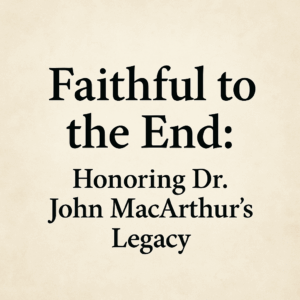⏱️ Estimated Reading Time: 9 min read
A preacher is a herald of Jesus. His task is to proclaim that the Seed of David struck down “Goliath” (death) and is now calling us to follow Him and enjoy the spoils of His victory. The preacher is to announce that God has chosen to “pass over” us because the Lamb has been slain, and now calls us to rejoice and remember this great redemption. He is to press home that the curtain has been torn and no longer divides us from God because Jesus—our great High Priest—has gone before us and made a way for us. And every preacher is to call for repentance from sin and faith in Jesus.
A preacher’s task is to proclaim the Biblical gospel in all its beauty and apply it to all of life. This is a joyful burden. To be faithful to Christ and helpful to the Church as they carry this burden, preachers need to depend on the Holy Spirit in preparation, in the preaching moment, and in the aftermath of the sermon.
In Preparation: Be Diligent and Learn Obedience
Two people come to mind when I think of preparing to preach: Timothy and Ezra. In 2 Timothy 2:15, Paul says, “Be diligent to present yourself to God as one approved, a worker who doesn’t need to be ashamed, correctly teaching the word of truth.” Timothy’s work, among many things, involved confronting false teachers, correcting wayward church members, and holding the line on fidelity to the Apostolic gospel. His work requires him to depend on the Holy Spirit and to be diligent in his study. Paul put these two together just a few sentences before: “Consider what I say, for the Lord will give you understanding in everything” (2 Timothy 2:7). His absolute dependence on the Holy Spirit pushed him deeper into study.
However, we should never clothe a neglect of preparation with platitudes about depending on the Spirit. “We have urgent need to study,” Spurgeon told his students, “for the teacher of others must be instructed.”[1] To be faithful and helpful in our preaching, we need to steep ourselves in the Scriptures. As we use our minds to puzzle through and contemplate God’s Word, the Holy Spirit reveals the glories of the gospel of Jesus Christ.
In Timothy, we see diligence in preparation. In Ezra, we see the vital connection between our public preaching and our walk with the Lord. I love the crisp summary of Ezra as a teacher in Ezra 7:10: “Now Ezra had determined in his heart to study the law of the Lord, obey it, and teach its statutes and ordinances in Israel.” It is easy and tempting to study each week simply because you need to say something on Sunday morning. Ezra shows us the crucial link between our study and our teaching: obedience.
For preaching to be helpful, we need to call people to obedience, which is an exhortation to walk by the Spirit. For preaching to be faithful, we need to keep in step with the Spirit and then say, “Follow me as I follow Christ” (Galatians 5:25; 1 Corinthians 11:1). Jesus goes before His disciples in bearing the cross. Preachers, as pastors, must be examples to the church and therefore should never say “Do as I say, not as I do.” Pastoral leadership “involves following Jesus personally and inviting others to follow you as you walk in the ways of the Chief Shepherd.”[2]
Spirit-dependent preparation is not about having something to say. Sermon preparation is personal formation. As preachers sit with the text, wrestle to understand it, and work hard to think of poignant applications and clear illustrations, the Holy Spirit works on the preacher. Ezra studied, obeyed, and then he preached. Preachers depend on the Holy Spirit in the study by being diligent and learning obedience.
In the Pulpit: Be Biblical, Point to Christ, and Be Clear
If you are going to depend on the Holy Spirit in preaching, you must root your preaching in the Spirit-inspired Scriptures. The author of Hebrews prefaces a quote from Psalm 95 with “Therefore, as the Holy Spirit says” (Hebrews 3:7). In his commentary, David Allen says this has at least three implications: “(1) the Holy Spirit speaks in Scripture; (2) the Holy Spirit spoke through Scripture to the author’s original audience; and (3) the Holy Spirit speaks to God’s people today through this text when they read these words.” [3] What Scripture says is what the Holy Spirit says. If we want our churches to be Spirit-led, preach the Bible.
Spirit-empowered preaching exults Christ. When Jesus tells His disciples what the Holy Spirit will do, He says, “He will glorify me, because he will take from what is mine and declare it to you” (John 16:14).
The Holy Spirit’s aim to glorify Christ pairs with His ministry of maturing the Church. Paul puts these together in 2 Corinthians. First, he says, “We all, with unveiled faces, are looking as in a mirror at, the glory of the Lord and are being transformed into the same image from glory to glory; this is from the Lord who is the Spirit” (2 Corinthians 3:18). Then he applies it: “Therefore, since we have this ministry because we were shown mercy, we do not give up. Instead, we have renounced secret and shameful things, not acting deceitfully or distorting the word of God, but commending ourselves before God to everyone’s conscience by an open display of the truth… For we are not proclaiming ourselves but Jesus Christ as Lord, and ourselves as your servants for Jesus’s sake. For God who said, “Let light shine out of darkness,” has shone in our hearts to give the light of the knowledge of God’s glory in the face of Jesus Christ” (2 Corinthians 4:1-2, 5-6).
Preaching that depends on the Holy Spirit will aim to make Christ fully known because that is the Holy Spirit’s means for making the people of God fully mature. I believe this means that one of our primary aims in preaching must be clarity.
People want to know what the Bible has to say on life’s most important matters. People in our churches want to follow Christ by faith, they want to glorify God by a long obedience, and preaching with clarity helps them do that. Preachers love the Church well by showing the clarity of the text, by providing clarity on confusing passages, and by stating the implications and applications of the Bible simply and concretely. Good preaching applies the truth of the Bible to the lives of the listeners with boldness, love, and clarity.
In the Aftermath: Be Prayerful
We cannot force God’s work on people. The Holy Spirit is the one who awakens faith, sanctifies, gives every believer gifts for building up the Church, and—as the seal of God’s favour—keeps us faithful to the end.[4] We cannot force the work of God, but we can trust that God is working.
I’m trying to read through Calvin’s Institutes this year, and this paragraph I read recently reminded me why prayer and preaching must go together.
“But our mind has such an inclination to vanity that it can never cleave fast to the truth of God; and it has such a dullness that it is always blind to the light of God’s truth. Accordingly, without the illumination of the Holy Spirit, the Word can do nothing. From this, also, it is clear that faith is much higher than human understanding. And it will not be enough for the mind to be illumined by the Spirit of God unless the heart is also strengthened and supported by his power.”[5]
Everything I aim to accomplish through the ministry of the Word is ultimately accomplished through the Holy Spirit. Therefore, the pastoral call is to be faithful in preaching the word and diligent in prayer. Spurgeon told his students, “Abundant prayer must go with earnest preaching.”[6] The Apostles said it first, “But we will devote ourselves to prayer and to the ministry of the word” (Acts 6:4). Prayerful proclamation of the truth is the pattern for Spirit-dependant gospel preaching.
In Everything Be Yourself
After a sermon a few years ago, a friend made an off-handed comment about how I almost made a perfect John Piper-like adjective stack. Often young preachers sound more like their influences than themselves. While we should always aim to learn from the best preachers, remember to be yourself. The Holy Spirit is the one who called you to preach where you are today.
Paul lays down the weightiness of pastoral duty for the Ephesian elders by reminding them that the Holy Spirit called them to the office. “Be on guard for yourselves and for all the flock of which the Holy Spirit has appointed you as overseers, to shepherd the church of God, which he purchased with his own blood” (Acts 20:28). If God wanted John Piper at my church, he would bring John Piper to my church. But since, at this time, he’s called me, then I can be myself when I preach. Brother Preacher, this gives incredible assurance and freedom to be yourself.
By being yourself, you testify that the Holy Spirit doesn’t make mistakes. Pastoral preaching is a spiritual ministry carried out in weakness and full dependence on the Holy Spirit. Apart from the Holy Spirit, no one is sufficient for the work. Therefore, brothers of the pulpit, in your preparation, be diligent to study and obey (walk by the Spirit). In the pulpit be clear, be Biblical, and always be about Jesus (align with the Spirit’s aim). In the aftermath, be confidently prayerful that God will be faithful to his word (trust the Spirit’s work). And be yourself (preach with the assurance of the Spirit’s call).
_________________________________________________________
References:
[1] Charles Spurgeon, Lectures to My Students (Christian Focus Publications, Geanies House, Fearn, Tain, Ross-shire, IV201TW, Great Britain, 2008), 216.
[2] Tony Merida, Christ-Centered Expositor: A Field Guide for Word-Driven Disciple Makers, (Nashville, TN: B & H Academic, 2016), 86
[3] David L. Allen, Hebrews, The New American Commentary (Nashville, TN: B & H Publishing Group, 2010), 256.
[4] Awakens Faith (1 Thessalonians 1:10-11), Sanctifies (1 Peter 1:2), Giver of gifts (1 Cor 12), Seals and keeps believers (Eph 1:13-14).
[5] John Calvin, Institutes of the Christian Religion & 2, ed. John T. McNeill, trans. Ford Lewis Battles, vol. 1, The Library of Christian Classics (Louisville, KY: Westminster John Knox Press, 2011), 580–581.
[6] Charles Spurgeon, Lectures to My Students (Christian Focus Publications, Geanies House, Fearn, Tain, Ross-shire, IV201TW, Great Britain, 2008), 225.




